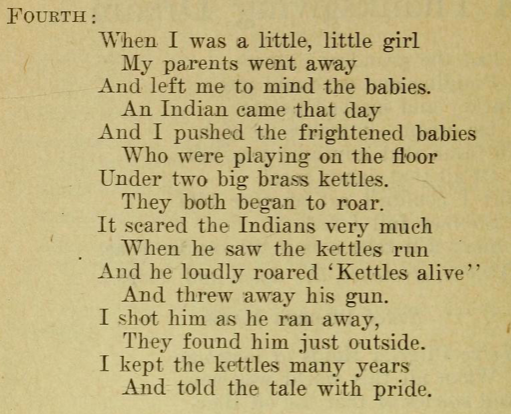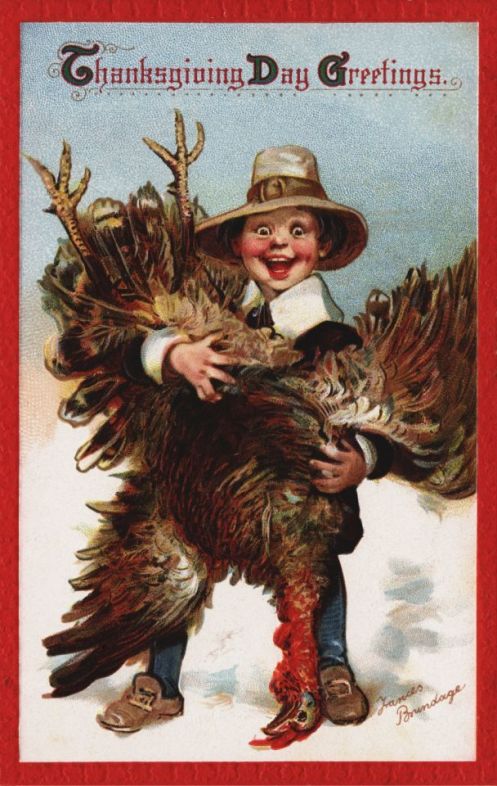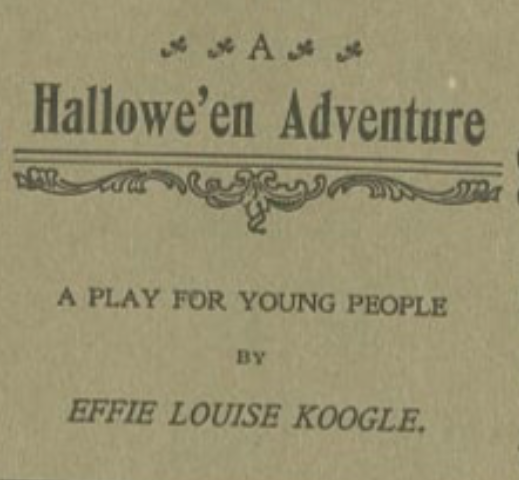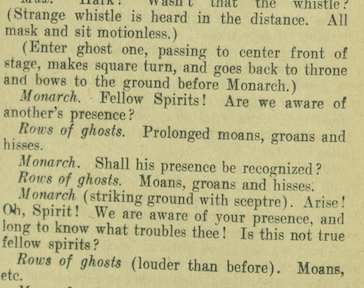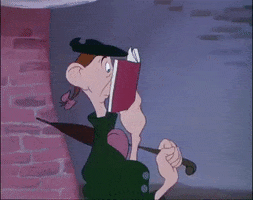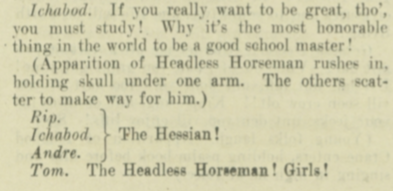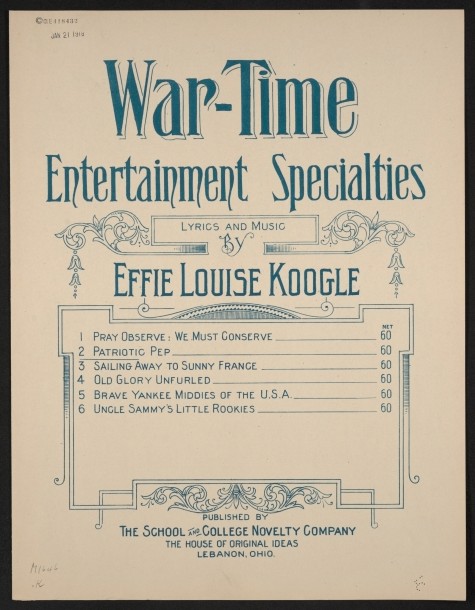Howdy everyone and welcome back to Unknown Playwrights!
Exciting, emerging playwright Lydia Valentine comes to us via Aliquippa, Pennsylvania and currently resides in Tacoma, Washington. In fact I stole her biography from her New Play Exchange page:
“Lydia Valentine is a poet, playwright, and educator who believes in the power of good, the healing capacity of writing and reading, and the necessity of the Oxford comma. A passionate advocate for equity and social justice, proud mom, and card-carrying Blerd, Lydia grew up in Aliquippa, Pa, a small, steel mill town north of Pittsburgh, where she spent many hours of her youth at B.F. Jones Library.”

“She now lives, reads, and writes in another gritty city, Tacoma, WA, where she has been runner-up for Tacoma Poet Laureate twice. Lydia has recently completed her first play, Aliquippa, which has had readings at empathos company, and has been Assistant Director and Dramaturg for play productions with Toy Boat Theatre Company, empathos company, UW-Tacoma, and Tacoma Little Theatre.”

She has crafted an incredibly deep, heartfelt play set entirely in her hometown.

The play focuses on the Lockwood family:

There’s only one character who isn’t a blood relation.
The play starts with Naomi, a woman stuck in a type of twilight zone due to past misdeeds and happenstance. Her own mother (Mama Shirl) barely acknowledges her. Same with her own daughter, Rachel. One could say she’s a loser in a hero sandwich. Mama Shirl is the ultimate survivor. Rachel is hopeful to return to school to finish her college degree. Both women have their lives in relative order. Naomi does not. The following is what happens when she calls her daughter.

Calls her own daughter a heifer. And again…

I don’t blame Rachel for not wanting to talk to her mother. Sometimes Naomi takes care of Rachel’s son Tamir. She does the best she can. Naomi also dreams of opening a commuity center in town.
The play really swings into motion when Tamir gets bullied and attacked on account of his race. Naomi and Rachel’s reactions reveal the generation gaps that exist in the play and provide much of the conflict:

So…racism in American elementary schools is totally real.
Not-so-coincidentally in Pennsylvania.

Beyond the racist teachers, there’s that whole other oil drum of Nazi worms: racist students. Recently, an entire school district in Minnesota was sued for allowing racist bullying. In New Hampshire, an elementary school student was bullied and then the school board attacked the mom, because they suck. Back in Harrisburg, in our favorite state of Pennsylvania, the same dang thing. Meanwhile, in America’s bleach stain, aka Utah, some white kids tried to wash a girl’s skin color off with a solution. What the Hell, America?
Naomi tries to give Rachel advice on how to handle the situation. Rachel reminds Naomi of the reason her kids got taken away.

Naomi is still in the denial phase about a lot of things.

On a side note, one thing I love about the play is the description:

We know exactly what world Mama Shirl inhabits just from reading that description.
[pic]
Oscar and Isaac almost get into trouble and relate the situation to Rachel.


When Rachel mentions they could’ve modified their behavior to avoid a situation, Oscar and Isaac talk to Rachel about the realities of being a young black man in modern America.



For anyone not familiar with the cases the play references, Michael Brown was killed in Ferguson, Missouri basically for not walking on the sidewalk being African-American.
Philando Castille was killed in Minnesota (that place, again) for supposedly having the “same wide-set nose” of a robbery suspect.
Eric Garner was choked to death for selling cigarettes one by one being African-American. It only took the NYPD five years to fire his killer.
Freddie Gray was killed in a Baltimore police van for having a legal knife being African-American.
Isaac and Oscar’s dialogue/reality lesson continues:

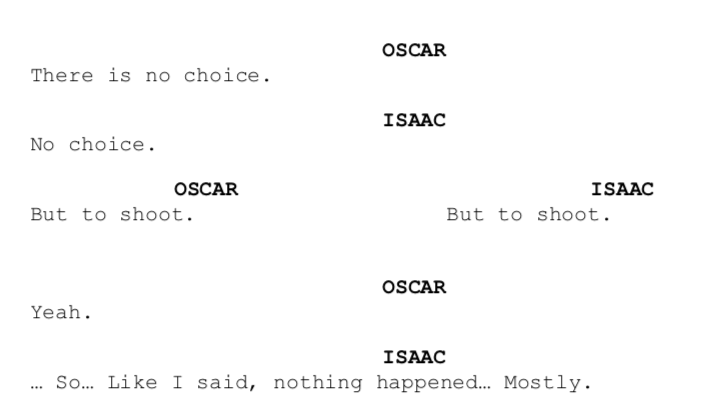
Mostly.

Naomi goes off on her mother, Mama Shirl, when Mama Shirl mentions Rachel’s early plan to be a doctor and things didn’t quite turn out like that.

Naomi does a good job of upending religious hypocrisy, where people can pick and choose what God’s plan is and what’s someone just screwing up.
Rachel relates when Mama Shirl caught her trying a beer.

There’s some good-natured sibling rivalry between Rachel and Isaac. Isaac is the family member everyone seems to have their hopes pinned on. He’s a college football star and has plans for the NFL. In reality, only 1.5 percent of college players ever make an NFL roster.
Aliquippa is kinda famous for producing NFL players like Hall of Famers Mike Ditka, Tony Dorsett, and Ty Law, as well as Darrell Revis.
There is some engaging banter between Rachel and Oscar.
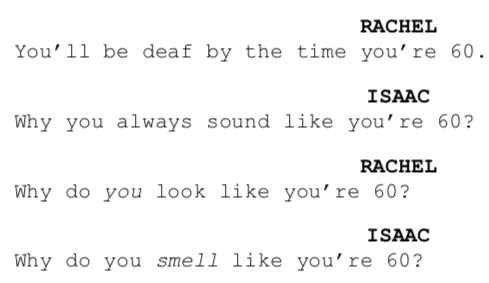
Another Isaac zinger:

The main thing audiences and readers should know is that Aliquippa was once a small, yet economically robust steel mill town. This lasted for most of the 20th Century until the mill finally closed in 1984. A quick look at the town’s historical population can give some clues:

When your town has 1/3 of the population it had 90 years ago, your town might be in trouble.
To get a more visual picture of what ails Aliquippa, check out this photo essay from 2015.
In more positive news, Aliquippa’s government recently released a blight-to-bright plan.
But it’s still a place where a school board member is accused of threatening to stab a couple seventh graders.

One cool theatrical device the play uses is the freezing of time. Naomi is asking to borrow money from her daughter. The play uses this instance to freeze action and time.
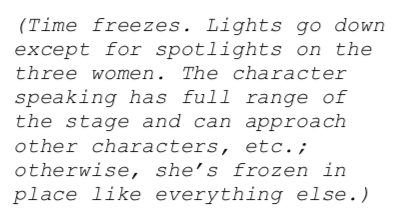
Rachel is then free to comment on the situation.

Later, Mama Shirl’s sancto self gets served by Naomi.

Maybe this limbo that Naomi lives in isn’t entirely her own doing. Naomi isn’t done unloading on Mama Shirl.

As much as the play explores the dynamics that made Naomi the woman she is today, the present-day takes over. Oscar has something horrible to report.

Isaac caught a stray bullet.
From tragedy, comes some type of positivity. Several family members are able to move forward with the community center they were planning. Rachel also makes peace with Naomi and is almost set to go to the West Coast for school. Naomi is kinda, sorta closer to making peace with Mama Shirl.
Some really cool things about this play:
- Theatricality. Already mentioned above, the play plays (hehe) with time and memory to create a theatrical experience.
- Local flavor aka local color. This is a tradition that hearkens back to writers like Bret Harte, Frances E.W. Harper and Charles W. Chesnutt, where a work of literature is rooted in a specific time, place and culture. In Valentine’s work, we inhabit the world of a family in Aliquippa, Pennsylvania. The play even uses local terminology such as “Quip” “jitney” and “PennDot.” We can feel life in the dying steel town. This is reminiscent also of the work of Stacey Bryan, Yolanda Mendiveles and Benjamin Gonzales, all of whom have been featured on this blog.
- Issues of the day. Not only does the play address racism, the Rust Belt, and police violence, but there is a gender role subplot regarding Tamir, who likes his hair long and dresses up like a cowgirl.

This causes some conflict among the different women in Tamir’s life. He also plays with Pony Princesses.
4. Uniqueness. Slice-of-life dramas depicting African American families are sorely lacking on the American stage. This would be welcome relief from the bazillionth community college production of The Mousetrap.
Ms. Valentine was kind enough to answer some questions for us.
1. How did you start playwriting?
I have always been a fan of theater and have taught many plays to my students, but it was not until I applied to Goddard College’s MFA in Creative Writing program that I considered delving into dramatic writing. I am primarily (and have always thought of myself as) a poet. However, I decided that if I was going to get direct instruction in craft, I wanted to take a shot with a new genre.
2. What are your influences?
My biggest influences are my experience as a Black woman and mother and the fact that for too long the narrative of those who are usually marginalized, silenced, or ignored (BIPOC, the LGBTQIA community, women, etc.) has been crafted and told by others. There is a short allegory that I find striking in relation to this.
The young boy went to his grandfather and said, “Grandfather, is it true that the lion is the king of the jungle?”
“Yes,” said the old man, “but why do you ask?”
“Well,” said the boy, “in all the stories that I read and even in the ones I hear, man will always defeat the lion. So, how can this be true?”
The old man looked his grandson in the eyes and said, “It will always be that way, my son, until the lion tells the story.”
Moving beyond what Chimamanda Ngozi Adichie calls “The Danger of the Single Story” is crucial.
In terms of writing, I am definitely influenced by August Wilson, whose plays celebrated the everyday experiences of Black people and were all set in Pittsburgh, where he grew up. I am from Aliquippa, a small city just north of Pittsburgh, so Wilson has long been on my radar. Other playwrights I consider to be influential are Lynn Nottage, Dominique Morrisseau, Kirsten Greenidge, Henrik Ibsen, and Shakespeare.
3. What is your most memorable production and why?
(In terms of my play, Aliquippa, I have had several readings, and all of them are memorable, but two stand out in particular. When I first finished the script, we had a closed reading for which my sister, daughter, son, nephew, and I provided the cast. It was incredibly poignant for me to hear my words brought to life by these people who are so important to me. The other one was a larger reading with actors we’d cast. Watching the audience respond to this story and these characters convinced me that this play was one to which anyone could connect.)
I worked on a production of Clybourne Park as the Dramaturg and Assistant Director for Toy Boat Theatre in conjunction with the University of Washington Tacoma. This was a memorable experience because the cast and production team gelled as a family. Rehearsals were full of levity and intensity in equal measure. I love to laugh. There were no egos or prima donna moments. The most important thing was bringing the story to the stage. There are very dark comedic elements that resonated with many in the audience, in particular those of us who have long had to keep our sense of humor to get through trying times. Also, because the play deals with themes of dislocation and gentrification, there were parallels for what is happening in Tacoma right now.
4. What is your least memorable production and why?
The one that hasn’t happened yet! I have been submitting Aliquippa to festivals and calls for plays, but I have not yet had any success. So many venues require a script to be submitted by an agent, so that leaves me out of the running.
5. What’s your funniest theatre story?
I co-adapted the script of Ibsen’s A Doll’s House with Marilyn Bennett and served as Assistant Director for the production, which was staged as a part of Tacoma Little Theatre’s 100th season. After the show on opening night, a member of the Board of Directors said a few words to the audience, then invited Marilyn to speak, and after that called me forward. I am fairly shy and also autistic, so not only was I mortified but also the first words out of my mouth were, “Well, this is mortifying.” In retrospect, I think it’s pretty funny, but at the time I felt a little bad when I saw the look on the board member’s face at my pronouncement.
6. What are your writing habits like?
I wish that I could say that I write in the morning during my almost two-hour commute to work and again on the trip home. I take the train or bus for that specific purpose (and also to avoid the stress of navigating the traffic on I-5). I’m not a morning person, though, so I am barely able to form coherent thoughts that early, and in the evening, after teaching all day, I usually just pull up a game on my phone and listen to an audiobook until I get home. My best writing time is late at night. I curl up in my giant, cushy armchair and type away. Unfortunately, I have to go to bed pretty early, so I have been scheduling writing dates with friends and my sister because being around other creatives always gives me the boost I need to write.
7. What advice do you have for new playwrights?
The best advice that I have been given was from one of my advisors at Goddard, Darrah Cloud, who also happens to be a poet and playwright. After reading my very first attempt at starting Aliquippa, Darrah told me, “Stop writing this as if it’s fiction. It’s not. Write it like poetry.” What I took away from that was to listen to the voices of the characters and let them tell the story that they were trying to tell.
8. Who are some other writers you feel should get more attention?
Playwrights Christina Anderson (How to Catch Creation), Kirsten Greenidge (Luck of the Irish), and Donte Felder, who has produced several plays in the Seattle area. His next production, Blerds Comics and Cafe, which leans into speculative fiction and explores the nuances of the comic book world, gun control, and race, will premiere in the fall of 2021.
9. What are common themes in your work?
Family and familial love are big themes for me, whether related to actual family units or the found families that we create for ourselves. I am somewhat fixated on the collective loss and grief that impacts the physical, emotional, and mental health of Black people, as well as the intersectionality of various identities (race, gender, queerness, neurodiversity, class).
10. What is one thing you wished you knew now, that you didn’t know starting out?
I wish I knew more about the ways to get a play from page to stage and which options for getting plays out into the world were the best ways.
11. How autobiographical is Aliquippa?
While it takes place in my hometown, Aliquippa is not autobiographical at all. At the same time, I can recognize aspects of myself – often amplified – in each character: Naomi’s fierce love for her family, Rachel’s tendency toward seeing things in black and white, Mama Shirl’s faith, Isaac’s optimism, Oscar’s loyalty, and Tamir’s naive pragmatism.
12. What have the audience reactions to Aliquippa been like?
The response has been positive! While on paper, Tacoma is similar to Pittsburgh demographically, the ethos of the Pacific Northwest is vastly different from that Western Pennsylvania, so I was wary of what the response would be as I’ve workshopped it here, because I did and do not want it to be misunderstood. However, the feedback of audience members from a variety of backgrounds has been that they can relate to these characters despite what are – at times – quite different circumstances, and that is gratifying.
13. What have been the biggest obstacles in getting Aliquippa a full production?
Three things come to mind: time, money, and connections, with time being the biggest of the three obstacles. I am a full time teacher in Seattle, and I live in Tacoma. I’ve already talked about my gnarly commute. I’d love to have the time to focus on making the connections and obtaining the funds to find the right space, fill out the roster of actors and production team, compensate those involved, market, etc. Chevi Chung of empathos company is doing a phenomenal job shepherding me through various stages of the process, but my ability to make progress is hampered by only having fits and starts of time.
14. Aliquippa has some themes and a character name in common with Angelina Weld Grimké’s play Rachel. Are there any connections between the two?
It’s interesting that you mention this play because I did not have any familiarity with it until one of my students did a presentation on Angelina Weld Grimké and Rachel just a few months ago. While I have not read the play myself, I do not feel as if they are that similar based on what I know of Rachel. Both of my thesis advisors made comparisons to Lorraine Hansberry’s Raisin in the Sun, and I am incredibly humbled to have Aliquippa even mentioned in the same sentence as Raisin. “Lydia Valentine has written a tour-de-force family play that rivals Raisin in the complexity of its characters, the pain of its situation, and the beauty of the writing. I do not make that comparison lightly. Hansberry is a hero of American letters, and I see the same potential in Lydia to write people onto the stage from whom we have not heard before, and to make the most seemingly mundane conflicts central and epic.”- Darrah Cloud
15. What are you currently working on?
I have two new plays I am working on concurrently. One explores the experience of being a black autistic woman, and the other is a one-act centering on a found family of three socially awkward, female or gender queer superheroes.
Thanks so much for chatting with us, Lydia! I think we’d all love a play about socially awkward, gender queer superheroes.
To connect with Lydia, you can follow her on Twitter. If you have access to the New Play Exchange, her play is available to read there.
Thanks for ready and we’ll catch you in a couple of days forMonologue Monday!











































